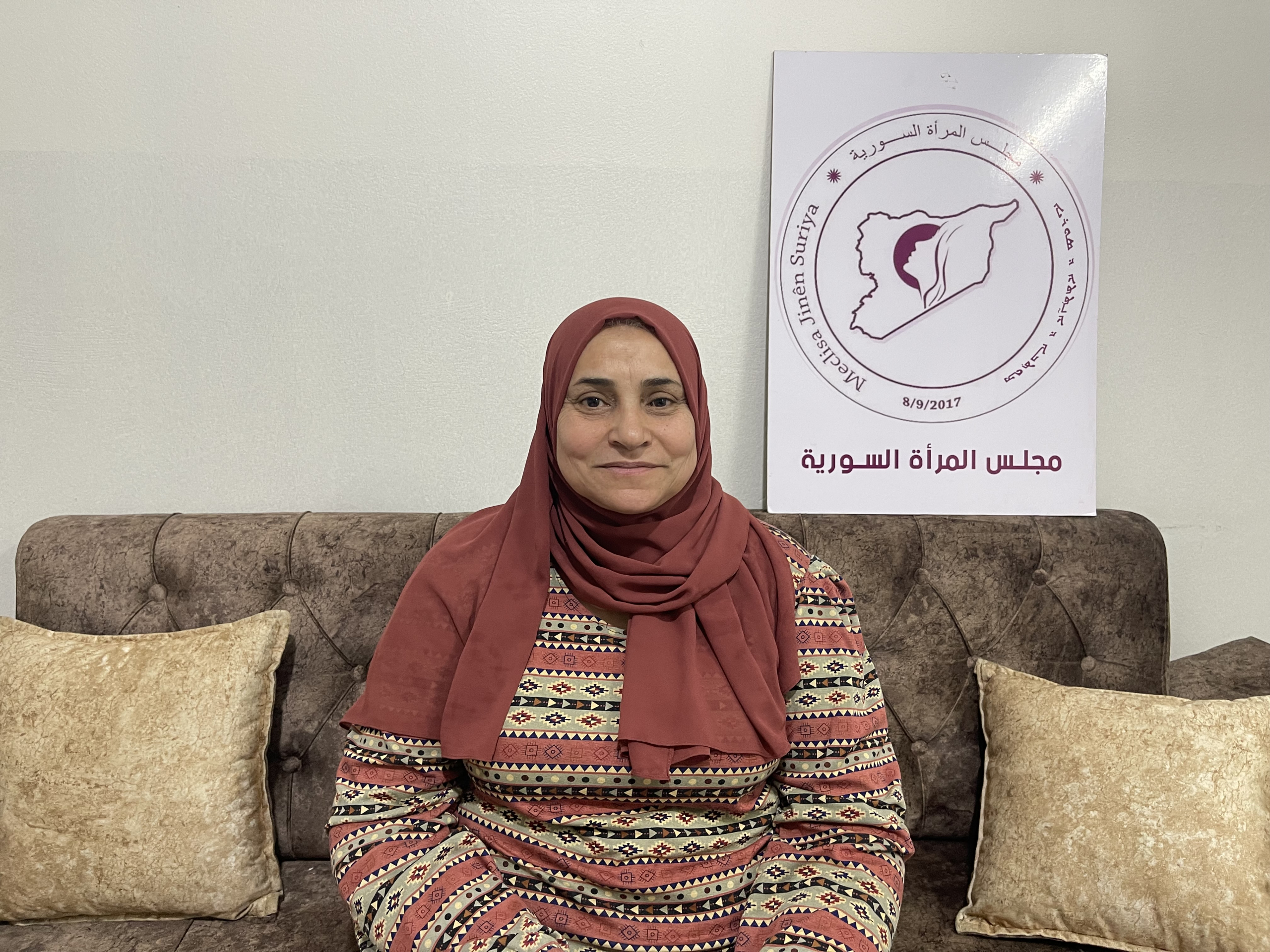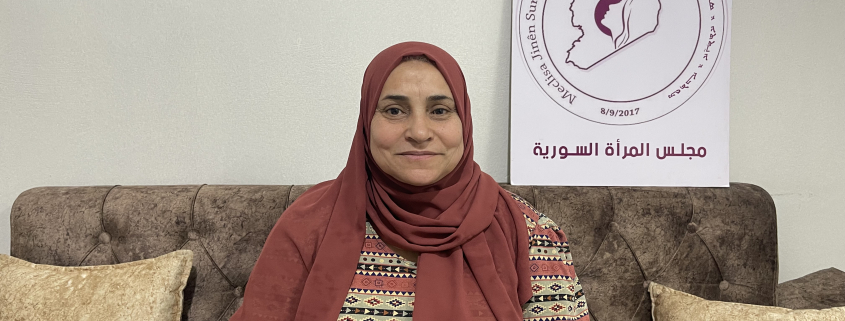Interview: “We aim to ensure that women play a part in constructing the new constitution” – Mona Youssef, Syrian Women’s Council

Mona Youssef, administrator of the Jazira Canton office of the Syrian Women’s Council spoke to RIC about the recent developments in Syria, potential avenues for change and action in the current situation, and the work of the Syrian Women’s Council therein.
RIC: What is the Syrian Women’s Council?
Youssef: The Syrian Women’s Council was established on September 8th, 2017. It is a feminist council that functions as an umbrella organization. It encompasses civil organizations, representatives of political parties and independent figures. Our council operates not only in North and East Syria [NES] but throughout all of Syria. The Syrian Women’s Council was established to address the ongoing suffering of women; a problem that has persisted throughout history and is deeply entrenched in societal norms and traditions. The crisis in Syria has only exacerbated the suffering of women, and led to displacement, poverty, killings and violations. Women were already facing difficulties before the crisis, and their misery has only intensified in its aftermath. The experiences gained in NES and the women-led revolution provided a solid foundation for our efforts.
Were the recent developments in Syria a shock to you? Were you anticipating the offensive of HTS
The Syrian crisis has been ongoing for 14 years. The most recent period has been marked by stagnation. The recent developments were not anticipated, particularly the seizing of Syria by Hayat Tahrir al-Sham. We had expected that Iran’s role would diminish in the region. The Turkish attack was foreseeable due to the Turkish state’s antagonism towards any democratic initiative. Turkey seeks to restore the glories of the Ottoman Empire and wants to control as much of the region as possible by occupying it. Since the Gaza war, the Syrian Women’s Council anticipated rapid change in the region because all situations are interconnected. The war in Gaza, the killing of the Iranian president and the attack on Lebanon all indicated that events in Syria would change. However, the rapidity with which these events unfolded was not anticipated.
Do you anticipate another period of prolonged conflict in the near future?
We are at a major critical juncture. The situation has not stabilized, as evidenced by the ongoing conflict in Lebanon and the failure of any Arab country in which a regime has fallen to stabilize. The only thing that gives us some hope is the administration in NES [the Democratic Autonomous Administration of North and East Syria – DAANES]. If the other parties, the international community and the new American government led by Trump enter into dialogue with us and put an end to the Turkish attacks through negotiations, the DAANES can chart the future of the region. The DAANES is open to any talks that will save the Syrian region, including dialogue with HTS. One can say that HTS’ experience in Idlib worked out, in that it was as stable as our areas in NES. If HTS rejects Turkish interference and does not return to its extremist mentality, there will be stability. However, if it allows Turkey to interfere in the Syria, the situation will deteriorate, leading to infighting, civil war and sectarianism. The Alawites are now in a very tense situation in the region; they live in a state of fear and terror.
The Syrian people must be aware that they are the ones who sacrificed during this revolution. They are the ones who lived in poverty. They are the ones who lost their children. They are the ones who endured displacement and suffering. The people must be more aware enough not to get drawn into hate speech and division, because they are the owner of this cause and they must stick to the right side.
There have been many initiatives to solve the Syrian crisis since 2011 – all of which failed. Now the conditions have completely changed. What possibilities do you see ahead?
Since the onset of the Syrian crisis in early 2011, all involved parties have sought to advance their interests. Russia, for instance, supported the former Syrian regime in light of its own vested interests. The Syrian crisis represented a strategic opportunity for Russia to re-establish its presence in the region, particularly in the wake of its failure to capitalize on opportunities in the aftermath of the Second World War. The establishment of military bases within Syrian territory by Russia can be seen as a manifestation of its aspirations to gain a foothold in warm waters. This ambition, in turn, was a key factor in its decision to support the Syrian regime. However, following the realization of its objectives, Russia has ceased to provide any form of support to the Syrian regime. The involvement of other actors, such as Turkey and Iran, is also noteworthy. Iran, for instance, supported the Syrian regime and played a significant role in the Syrian crisis. However, its motivations were not aligned with those of Russia, as it sought to advance its own agenda. The meetings held in Astana and Geneva, among others, proved unsuccessful due to the conflicting interests of the involved parties, which hindered the resolution of the Syrian crisis. It is evident that all negotiations that transpired excluded the Syrian populace and institutions who aspired to negotiate autonomously. Consequently, the rationale behind external entities negotiating on behalf of the Syrian people becomes questionable.
Since the beginning of the crisis, all parties have been looking at Syria as if it were a cake that they want to divide. Each wants to take their share of it. Turkey has occupied a great deal of land and still aspires to control more under the pretext that there are terrorists on its borders and it is protecting its national security. On the contrary, we are the ones who must protect our national security from Turkey. We have never entered Turkish lands, nor have we fired a shot towards Turkey. Turkey is always the one who attacks and occupies Syrian lands. The Baath regime was lazy. It did not care about the Syrian territories. It only cared about collecting as much money as possible, looting Syria and its wealth and preserving it within the family. This is why the Syrian crisis lasted for a long time, and the parties that offered genuine solutions were excluded from the negotiations. The DAANES tried before to talk with the regime to put our hands together to solve the Syrian crisis, but the latter did not accept.
How are your relations with other women’s organizations or activists in Syria currently?
From the beginning of the establishment of the Council, our goal was to bring together the Syria in its entirety: all its regions and governorates. Practically, we had offices in Aleppo, Manbij, Tartous, Damascus, Suwayda and Latakia. Our offices were not only in NES. We also had representatives from inside and outside Syria. After the fall of the regime, we made a statement which led to over 13 requests from parties wanting to participate. This followed a discussion between many parties on the Syrian scene including women from the Opposition. The Syrian Women’s Council is open to all parties and sects in Syria. We aim to ensure that women play a part in constructing the new constitution, so that their rights and effective participation in all branches of the state can be guaranteed. In NES there have been achievements along these lines. A Social Contract has been written.
We have communicated with many organizations and parties. When we held our second conference in Aleppo in May, we had 90 women from inside Syria who attended. They came from Homs, Hama, Idlib, Sweida and Damascus. We have representatives in Lebanon and Dubai. Our goal has been to unify visions. Parties and organizations who were from other parts in Syria did not join us so readily, but they saw that we are here, on the ground, they saw our ideas and what our demands are, and that we seek to preserve women’s rights in a new constitution. Through this, we were able to establish common visions between organizations and parties. This was not easy. This happened after we held many conferences and forums. Our goal is to unite women, regardless of their sect or wherever they live within Syria. The important thing is that we end the suffering Syrian women have been experiencing and preserve our rights in the new Syrian constitution and ensure that women can equally participate in life.
What kind of civil administration do you expect from HTS?
We sent a delegation from the Syrian Women’s Council to Damascus to talk to the new government, if they agree to dialogue. They have made many promises, but we see that this talk and the things that happen on the ground do not match. As the Syrian Women’s Council, we have no issue with who will take over the government, even if it is HTS. We have a path, a goal and principles. One of these principles is a peaceful solution for Syria, and that the Syrian people secure their rights, and that there be no internal warring between sects and ethnic groups. We are for the freedom, unity and territorial integrity of Syria. We want a federal system, where all sects have rights. For example, Alawites must have the right to practice its religious rituals, express freely, and live as they choose. Syria must be decentralized, pluralistic and democratic. This is our goal and this is our path.
The fall of the regime was a positive step, because the previous regime did not want to solve the crisis. The next step following the fall of the regime however, is a sensitive one. It needs a lot of work. Our delegation is now in Damascus. We will engage with al-Dibs, who is in charge of women’s affairs. We will see if she accepts our ideas, we will put our hands together. We are now in a transitional stage. We are not fully confident that the new government can control things and not create a security gap in the region. We have to be careful. We don’t want fighting between sects. We don’t want hatred being engineered, like the previous regime did, which led to killing people based on identity. This would drag the region into a long war. Therefore, this period requires a lot of work from us.
What is your position regarding the foreign forces who remain in Syria?
The US cannot now withdraw from Syria, because the situation is still unstable and we still have prisons full of ISIS members. The situation in Syria is a big crisis. ISIS families in al-Hol camp are like a ticking time bomb. An international trial for them has been requested. The Syrian Women’s Council has a camps committee. Every week we go to the camps and give awareness lectures to the women there. We try to extricate them from ISIS ideology, because there are women in the camp who are organizing themselves and committing many crimes. There is a new generation of ISIS being created in the camp.
So how do you see your position in this period?
A big role is on the shoulders of the Syrian Women’s Council. We want to be at the negotiating table. If we are not present in the negotiations occurring over Syria, the Syrian crisis will not be resolved. We represent the peaceful solution for all sects. We are now preparing to hold a forum in the near future to include all organizations, unions, parties and feminist figures who fight for women’s rights. We will discuss and determine the future steps and what our strategy will be, and we will continue along the path that we started.

